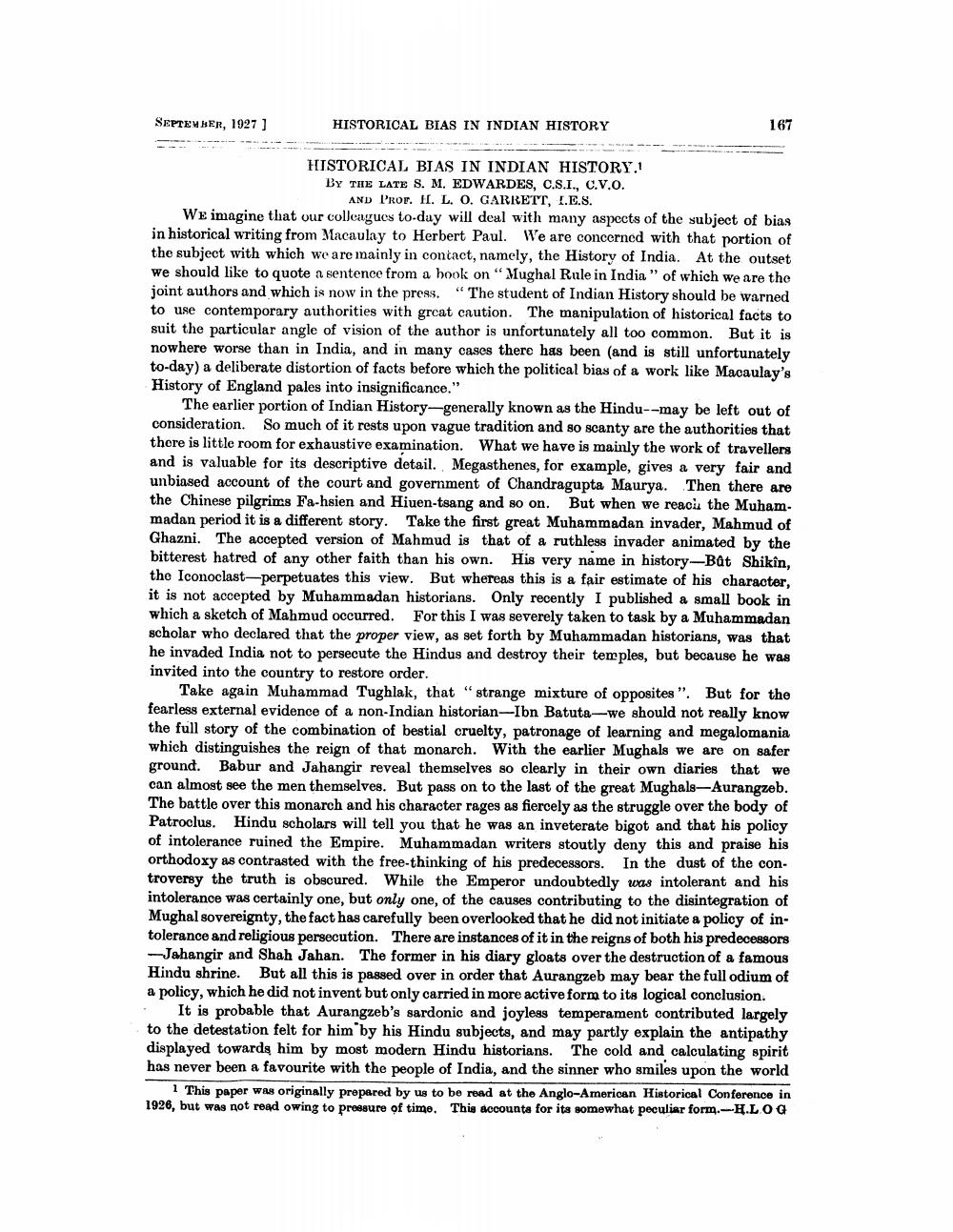________________
SEPTEMBER, 1927 )
HISTORICAL BIAS IN INDIAN HISTORY
167
HISTORICAL BIAS IN INDIAN HISTORY. BY THE LATE S. M. EDWARDES, C.S.I., C.V.O.
AND Pror. H. L. O. GARRETT, I.E.S. WE imagine that our colleagues to-day will deal with many aspects of the subject of bias in historical writing from Macaulay to Herbert Paul. We are concerned with that portion of the subject with which we are mainly in contact, namely, the History of India. At the outset we should like to quote n sentence from a book on “Mughal Rule in India" of which we are the joint authors and which is now in the press. “The student of Indian History should be warned to use contemporary authorities with great caution. The manipulation of historical facts to suit the particular angle of vision of the author is unfortunately all too common. But it is nowhere worse than in India, and in many cases there has been (and is still unfortunately to-day) a deliberate distortion of facts before which the political bias of a work like Macaulay's History of England pales into insignificance."
The earlier portion of Indian History-generally known as the Hindu--may be left out of consideration. So much of it rests upon vague tradition and so scanty are the authorities that there is little room for exhaustive examination. What we have is mainly the work of travellers and is valuable for its descriptive detail. Megasthenes, for example, gives a very fair and unbiased account of the court and government of Chandragupta Maurya. Then there are the Chinese pilgrims Fa-hsien and Hiuen-tsang and so on. But when we reach the Muham. madan period it is a different story. Take the first great Muhammadan invader, Mahmud of Ghazni. The accepted version of Mahmud is that of a ruthless invader animated by the bitterest hatred of any other faith than his own. His very name in history-Båt Shikîn, the Iconoclast-perpetuates this view. But whereas this is a fair estimate of his character, it is not accepted by Muhammadan historians. Only recently I published a small book in which a sketch of Mahmud occurred. For this I was severely taken to task by a Muhammadan scholar who declared that the proper view, as set forth by Muhammadan historians, was that he invaded India not to persecute the Hindus and destroy their temples, but because he was invited into the country to restore order.
Take again Muhammad Tughlak, that "strange mixture of opposites". But for the fearless external evidence of a non-Indian historian-Ibn Batuta-we should not really know the full story of the combination of bestial cruelty, patronage of learning and megalomania which distinguishes the reign of that monarch. With the earlier Mughals we are on safer ground. Babur and Jahangir reveal themselves so clearly in their own diaries that we can almost see the men themselves. But pass on to the last of the great Mughals-Aurangzeb. The battle over this monarch and his character rages as fiercely as the struggle over the body of Patroclus. Hindu scholars will tell you that he was an inveterate bigot and that his policy of intolerance ruined the Empire. Muhammadan writers stoutly deny this and praise his orthodoxy as contrasted with the free-thinking of his predecessors. In the dust of the controversy the truth is obscured. While the Emperor undoubtedly was intolerant and his intolerance was certainly one, but only one, of the causes contributing to the disintegration of Mughal sovereignty, the fact has carefully been overlooked that he did not initiate a policy of intolerance and religious persecution. There are instances of it in the reigns of both his predecessors -Jahangir and Shah Jahan. The former in his diary gloats over the destruction of a famous Hindu shrine. But all this is passed over in order that Aurangzeb may bear the full odium of a policy, which he did not invent but only carried in more active form to its logical conclusion.
It is probable that Aurangzeb's sardonic and joyless temperament contributed largely to the detestation felt for him by his Hindu subjects, and may partly explain the antipathy displayed towards him by most modern Hindu historians. The cold and calculating spirit has never been a favourite with the people of India, and the sinner who smiles upon the world
1 This paper was originally prepared by us to be read at the Anglo-American Historical Conference in 1926, but was not read owing to pressure of time. This accounts for its somewhat peculiar form.HLOG




